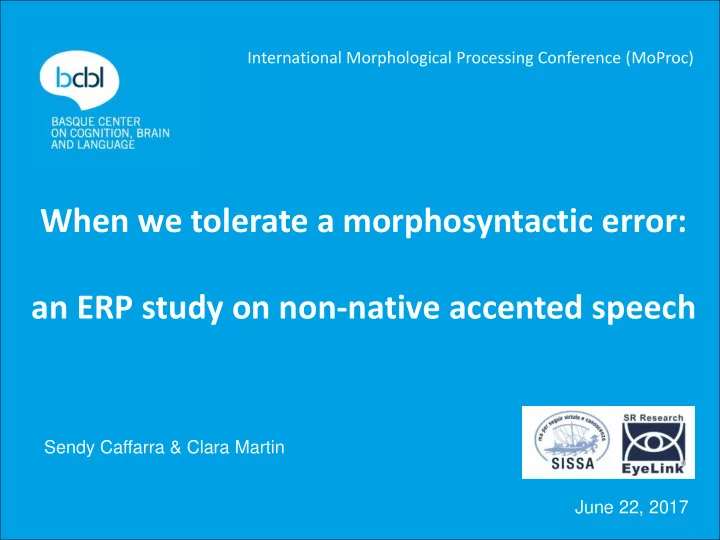

International Morphological Processing Conference (MoProc) When we tolerate a morphosyntactic error: an ERP study on non-native accented speech Sendy Caffarra & Clara Martin June 22, 2017
Non-native Native
RESEARCH QUESTION RESEARCH QUESTION How do native listeners deal with different types of morphosyntactic errors in non- native speech? Are they sensitive to the error typicality in non-native accented speech? Native 3
THEORETICAL BACKGROUND Morphosyntactic error De repente *la color del cielo cambió. Suddenly *the SF color SM of the sky changed. Native Pz F3 P600 LAN 500 400 Morphosyntactic violation Correct sentence Molinaro et al., 2011 4
THEORETICAL BACKGROUND Reduced P600 amplitude: Pz P600 500 Pz Pz with high exposure to the error (Hahne & Friederici, 1999) in non-native accented speech (Hanulikova et al., 2011) 5
THEORETICAL BACKGROUND In non-native accented speech: native listeners reduced attempts to repair grammatical errors. (Hanulikova et al., 2011) not all the morphosyntactic errors are equally frequent. Franceschina, 2001 6
THE RESEARCH QUESTION Does native listeners’ syntactic analysis change depending on the error typicality in non-native accented speech? They should reduce their attempts to repair the error as their exposure to that type of error increases (Hahne & Friederici, 1999) . 7
THE PRESENT STUDY Non-native Native 8
THE PRESENT STUDY Sentence example Translation Correct De repente el color del cielo cambió. Suddenly the SM color SM of the sky changed. Gender De repente *la color del cielo cambió. Suddenly *the SF color SM of the sky changed. Number De repente *los color del cielo cambió. Suddenly *the PM color SM of the sky changed. Native accent Non-native accent 9
Predictions P600 Pz LAN 500 Native accent Gender errors Number errors Non-native accent - - Gender errors - Number errors 10
METHODS Participants: 36 Spanish native listeners familiar with English-accented Spanish, who identified gender errors as a common mistake in Spanish L2 speech. Stimuli: Native or non-native accent 22 % gender violations (60) (3 speakers/ accent type) 22 % number violations (60) 56 % correct sentences (60 + 160 fillers) Low-constraint sentence context. Ratings: Sentences in native and non-native accent were equated for intelligibility and differed in accent strength. Morphosyntactic errors were easily detected in both accents. Online Task : comprehension questions (20% of the trials) High accuracy for both accents (native: 94%; non-native: 93%; t(35)<1). 11
RESULTS NATIVE ACCENT NON-NATIVE ACCENT Correct Gender violation Number violation Early negativities P600 window Early negativities P600 window 0 500 1000 ms 0 500 1000 ms 0 500 1000 ms 0 500 1000 ms - ? Gender Gender Number Number -2µV -2µV 12
RESULTS NON-NATIVE ACCENT Gender errors P600 b P600 a The higher the familiarity with the accent the smaller the P600 effect in response to gender errors (P600: r =-0.48, p <0.01). No significant correlations with the responses for number errors. 13
DISCUSSION Functionally distinct processes of syntactic analysis as a function of accent type. Native Accent LAN • First detection of the error followed by re-analysis and repair (Barber & Carreiras, 2005; Carreiras et al., 2003; Molinaro et al., 2011) . P600 Non-native accent Functionally distinct processes of syntactic analysis as a function of error typicality. • P600 Number : less-common errors are repaired/integrated • Gender : frequently-heard errors are not The attempts to repair gender errors (reflected by the P600) in non-native accented speech are reduced as the familiarity with the non-native accent increases. 14
DISCUSSION Non-native accent N400-like effect for gender errors Difficulties during lexical retrieval of the target noun (Grey & van Hell, 2017). Overreliance on contextual cues (i.e., determiner) in non-native accented speech (Goslin et al., 2012; Lev-Ari, 2014; Moreno-Rivas et al., 2016). Gender: De repente la … TARGET Number: De repente los … Control: De repente el … color The target word recognition will be more difficult after a gender-disagreeing determiner, which provides a misleading lexical cue. 15
CONCLUSION Does native listeners’ syntactic analysis change depending on the frequency of errors in non-native accented speech? Native listeners’ syntactic analysis changes depending on the type of error encountered in non-native accented speech. The time course of the parsing depends on input error typicality in non- native accented speech. 16
THANK YOU! s.caffarra@bcbl.eu
Recommend
More recommend